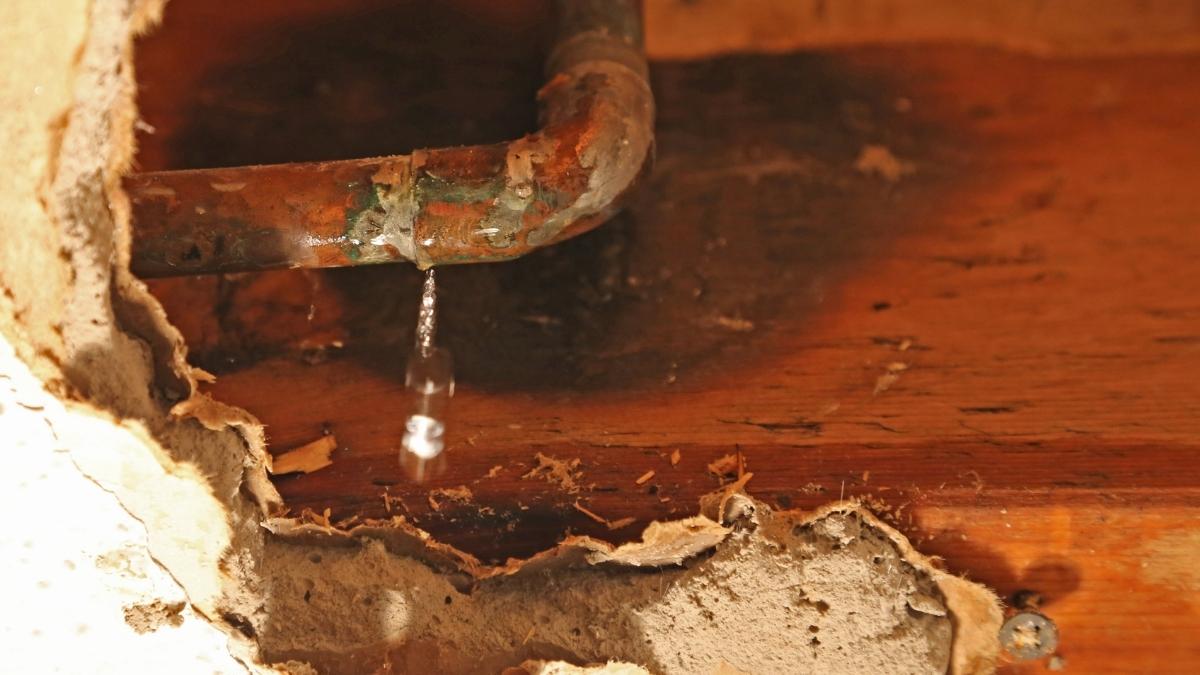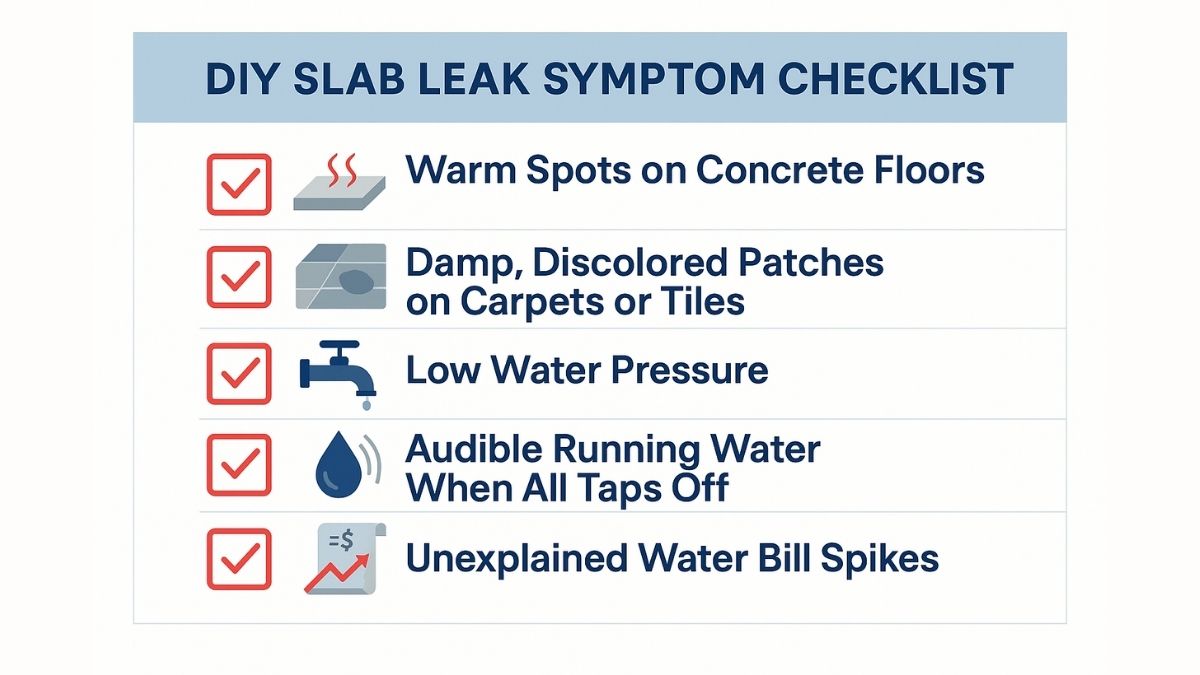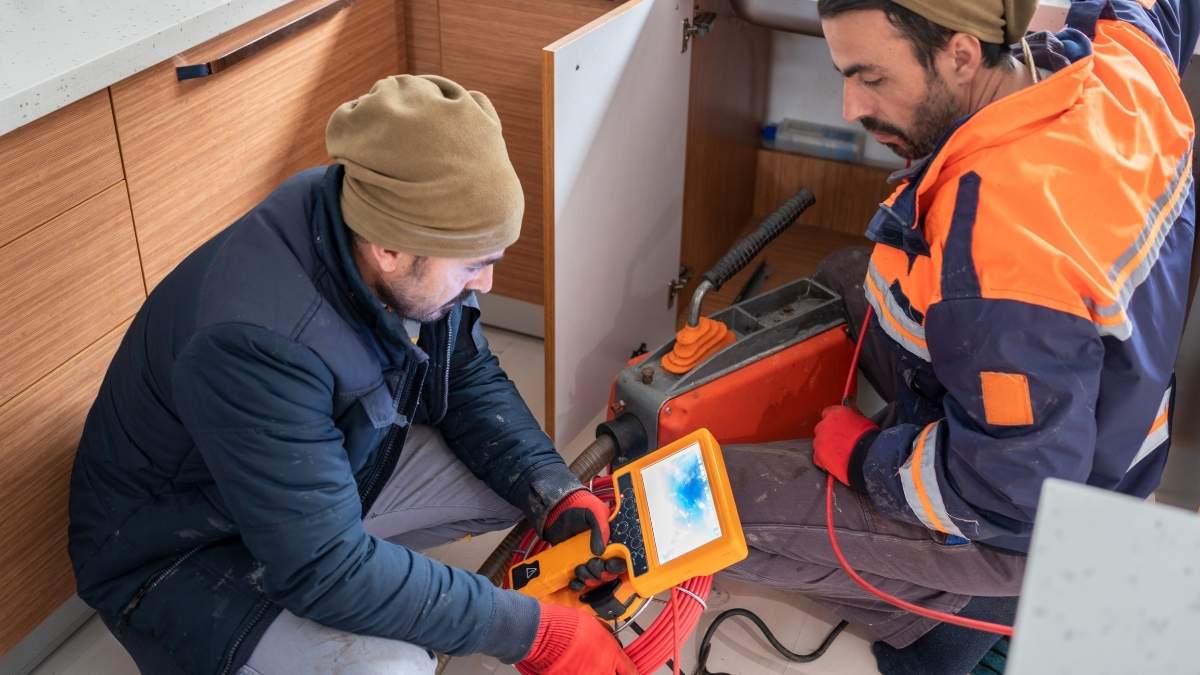A slab leak refers to a water leak occurring in the pipes running underneath your home’s concrete foundation.
In warm climates like Orlando, FL, where many homes are built on concrete slabs instead of raised foundations or basements, slab leaks are more than just an occasional issue. They’re a costly and surprisingly common hidden threat.
Quick Summary:
- Spot signs early like rising water bills, moldy smells, or warm floors
- Learn non-invasive ways pros detect leaks without breaking floors
- Compare repair methods: trenchless, rerouting, tunneling, and more
- See real-world cost ranges so you know what to expect
- Get actionable prevention tips specific to Orlando homes
Since the damage starts below the surface, many homeowners don’t realize what’s happening until it becomes a full-blown problem.
What Is a Slab Leak?
A slab leak occurs when a pipe in the plumbing system beneath your concrete foundation begins to leak. These pipes can be part of your hot water line, cold water line, or even your drain system.
Since the pipes are embedded in or run directly below the concrete slab, any leak can go undetected for days, weeks, or even months.
There are two types of slab leaks:
- Pressure line leaks: Often in water supply pipes, these are the most damaging because the water is constantly flowing under pressure.
- Drain line leaks: These may leak slowly and are often harder to detect until signs of moisture or mold appear.
Left unaddressed, a slab leak can weaken your home’s foundation, damage floors and walls, promote mold growth, and lead to thousands of dollars in repairs.
What Causes Slab Leaks?
Pipes under your slab face unique stresses that above‑ground plumbing does not.
Shifting soil, swelling when it’s wet, and shrinking as it dries press on buried pipes. Add in seasonal freeze–thaw cycles and the ground heaves just enough to crack even tough materials. Over time, those tiny fractures grow into full leaks.
Soil chemistry and installation shortcuts make matters worse. Hard water minerals and acidic dirt slowly corrode copper or polyethylene lines.
Pipes laid without proper sand bedding or bent at sharp angles carry hidden weak spots. And low‑grade fittings can fail long before their lifespan is up.
Common Causes of Slab Leaks in Orlando Homes
Orlando’s unique soil conditions, water quality, and climate can contribute to the frequency of slab leaks in the region. Here are the most common causes:
1. Pipe Corrosion
Water with high mineral content (hard water) can corrode pipes from the inside out. Over time, this weakens the pipe walls and causes leaks.

2. Poor Construction
If pipes were kinked, poorly insulated, or installed without sufficient wrapping during construction, they are more likely to fail over time.
3. Abrasion
Pipes that constantly rub against the slab or gravel can wear down, especially when hot water expands the pipe.
4. Shifting Soil
Florida’s sandy soil and high water table mean the ground beneath your home is often unstable. Any soil movement can stress pipes until they crack.
5. Water Pressure Problems
High water pressure in older pipes can eventually cause bursts or leaks in weaker sections.
6. Electrolysis
In homes with copper piping and other metal components, an electrical current can sometimes travel through the pipes, corroding them from within.ar over the year.
A sudden jump without added household use often signals a hidden leak gulping gallons around the clock.
Signs You Might Have a Slab Leak
Early detection of a slab leak can save you thousands. Keep an eye out for these common red flags:
- Sudden spike in your water bill
- Constant sound of running water even when taps are off
- Warm or damp spots on the floor
- Cracks in the walls or baseboards
- Mold or mildew smell
- Low water pressure
- Water is pooling around the foundation

If you notice more than one of these signs, it’s time to schedule a professional inspection.
How Plumbers Detect a Slab Leak (Without Destroying Your Home)
Modern slab leak detection relies on non-invasive technology that eliminates the need for large-scale digging.
Professionals use a combination of tools and techniques:
- Acoustic Listening Devices: These high-sensitivity tools pick up the sound of water escaping from pressurized pipes beneath the slab.
- Infrared Thermal Imaging: Thermal cameras detect temperature variations in the floor, useful for finding hot water leaks.
- Pressure Testing: Isolating zones within the plumbing system to test for pressure loss helps identify which line is leaking.
- Leak Correlation Equipment: Used to calculate the location of the leak by measuring sound and pressure differences.
- Video Pipe Inspection: In some cases, a waterproof camera is inserted into accessible pipes to confirm the leak’s location visually.

Comparison
| Repair Method | Description | Best For | Invasiveness |
|---|---|---|---|
| Trenchless Pipe Lining | Epoxy-coated inner pipe repair | Minor leaks in stable pipes | None |
| Pipe Rerouting | Digging beneath the slab | Older homes with multiple leaks | Low |
| Tunneling | Small leaks near the surface | Localized damage | Moderate |
| Direct Access | Jackhammering slab | Small leaks near surface | High |
1. Trenchless Pipe Lining (Cured-in-Place Pipe – CIPP)
A flexible epoxy liner is inserted into the pipe and inflated to coat the inside, sealing off leaks.
- Pros: Minimal disruption, no demolition
- Best for: Small to medium leaks in structurally sound pipes
2. Pipe Rerouting
New pipes are run through the walls or attic to bypass the leaking section.
- Pros: Avoids digging, upgrades plumbing system
- Best for: Multiple or major leaks, old plumbing systems
3. Tunneling Under the Slab
A tunnel is dug beneath the foundation to access and replace the damaged pipe section.
- Pros: Keeps flooring intact
- Best for: Isolated leaks in accessible areas
4. Direct Access (Spot Repair)
Jackhammering through the floor to reach and fix the pipe.
- Pros: Precise, cost-effective if leak is close to surface
- Cons: Damages flooring
- Best for: New homes with simple plumbing layouts
How Much Does It Cost to Repair a Slab Leak in Orlando?
Costs can vary greatly depending on the location of the leak and the repair method chosen. Here are general price ranges:
Slab Leak Repair Cost Breakdown (U.S. Avg)
| Service Type | Price Range |
|---|---|
| Leak Detection | $200 – $500 |
| Trenchless Pipe Repair | $1,500 – $4,000 |
| Pipe Rerouting | $2,000 – $6,000+ |
| Slab Access Repair | $3,000 – $8,000+ |
Always ask for a written estimate and discuss options with your plumber. Insurance may cover some slab leak damage depending on your policy.
How to Prevent Future Slab Leaks
While not all leaks are avoidable, these tips can reduce your risk significantly:
- Install a pressure regulator to control excessive water pressure
- Use a water softener if your home has hard water
- Schedule annual plumbing inspections
- Improve drainage around your home’s foundation
- Replace outdated piping systems before failure occurs
Being proactive can help you avoid costly repairs and structural issues later on.
Why Orlando Homes Are Especially Vulnerable
Orlando’s subtropical climate, combined with its sandy soil and high water table, puts added stress on your home’s foundation.
Constant temperature shifts and rainfall levels can lead to subtle shifts in the slab, making underground plumbing lines more prone to cracks and leaks.
This is why homeowners in Central Florida should be especially vigilant about signs of slab leaks and schedule inspections more frequently than in other areas.
What to Do if You Suspect a Slab Leak
If you think you may have a slab leak, don’t wait. The earlier it’s diagnosed, the easier and less expensive it is to fix. Here’s what you should do:
- Turn off your water main if you suspect an active leak
- Call a professional plumber with slab leak detection tools
- Avoid DIY repairs – accessing a slab leak without proper equipment can cause more damage
In Orlando, Our FL plumbers provides fast, accurate slab leak inspections and repairs using state-of-the-art technology.
Whether you need trenchless solutions or full rerouting, our licensed professionals are equipped to help without destroying your floors.
Final Thoughts: Do NOT Ignore the Signs
A slab leak might be hidden, but it’s not harmless. Whether you’re dealing with unexplained water bills or warm flooring, take it seriously.
Early detection and expert repair can save you thousands and protect your home from long-term damage.
Call a plumber now if you’re in Orlando or everywhere in Florida and want fast, reliable slab leak solutions.
FAQs
Does homeowners’ insurance cover slab leak repair?
Policies vary. Insurance may cover water damage caused by the leak, but not the repair to the plumbing itself. Review your plan or speak to your insurer.
How long does a slab leak repair take?
Small trenchless jobs may take a day. Larger reroutes or tunneling can take several days.
Will my floors need to be ripped up?
Not always. Many repairs are completed without breaking the slab using rerouting or trenchless methods.
Is a slab leak dangerous?
Yes. Left unchecked, it can damage your home’s foundation, encourage mold growth, and raise water bills dramatically.



